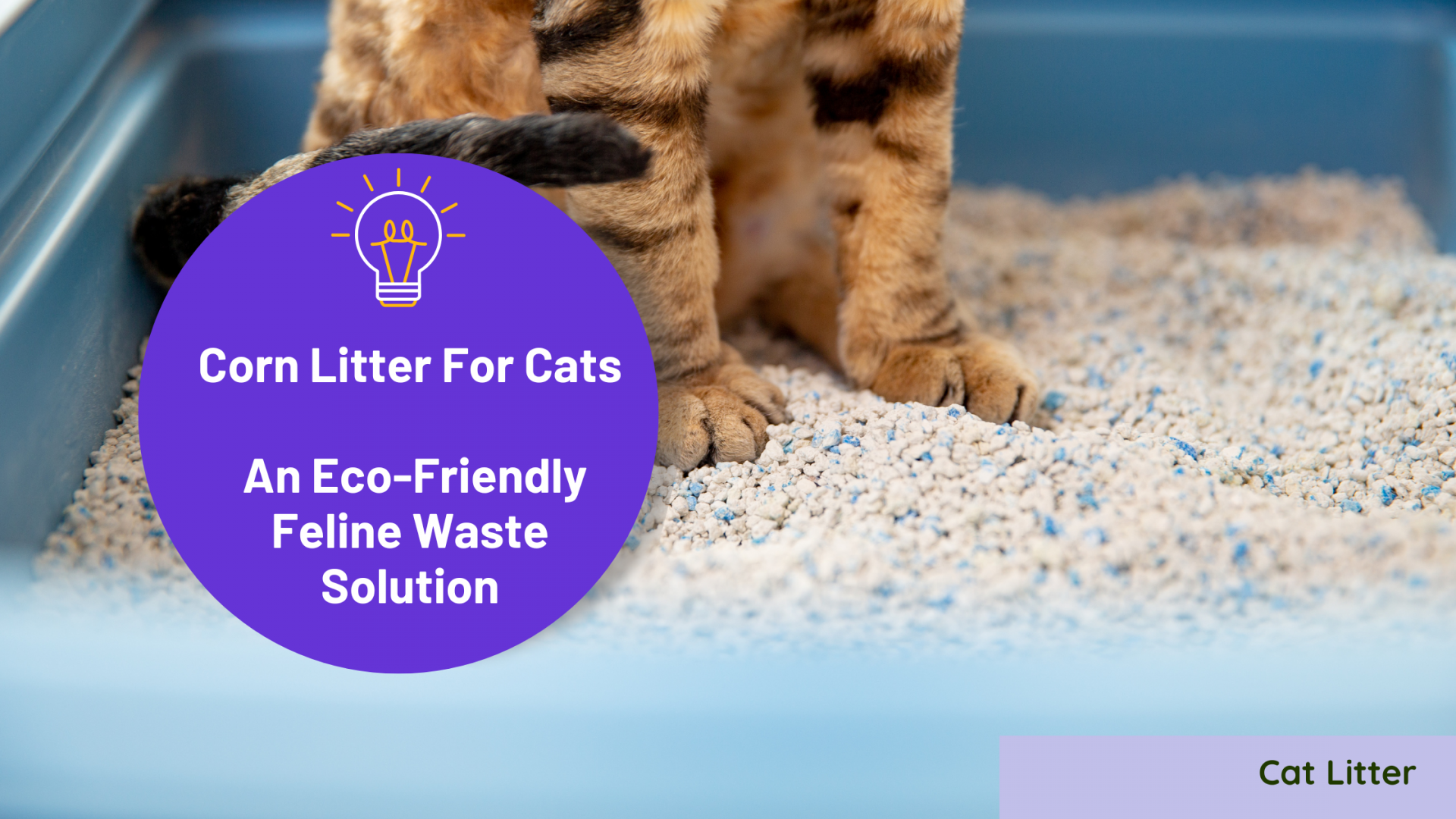When it comes to choosing cat litter for your furry family member, the choices can be overwhelming. However, if an eco-friendly option is what you’re after, you may have heard about corn cat litter.
Corn is not generally something you would associate with a product such as cat litter, but trust us, it exists.
If you’re wondering whether this might be the right fit for your home as well as your cat, this article will give you all the information you need.
What Is Corn Litter for Cats?
Made from compressed dried corn, corn cat litter has become a popular alternative to traditional clay as well as silica gel variants, mostly because it’s natural. What this means is that it’s safe for your feline friend as well as the people living in your home.
This absorbent cat litter also clumps, making any waste that much easier to scoop. What’s more, it’s biodegradable, which means you can easily flush it down the toilet after use, provided you don’t place it in a plastic bag.
It should be noted that even though most types of corn cat litter are flushable, you should rather check the ingredients first as these can differ between brands. Flushing cat litter is also illegal in some states such as California.
Corn Litter Pros and Cons
Even though there are a number of reasons why you should use corn cat litter, it isn’t without its flaws. Here are the pros and cons you should consider before you buy.
Pros
- Eco-friendly. Unlike some other types of cat litter, corn litter is made using ingredients from renewable sources.
- Lightweight. Corn is not only lighter than other varieties such as clay, but it’s much less dense too.
- Moderate dust. When compared to clay cat litter, corn litter produces far less dust, which means your home will be cleaner at the end of every week.
- Healthier. Thanks to all those natural ingredients, corn cat litter is one of the healthier options for your cat as well as your home.
- Flushable. Most types of corn litter can be flushed after use, making clean-up that much easier.
Cons
- More costly. Corn cat litter is going to set you back a few more dollars than other varieties.
- Average odor control. If controlling unpleasant odors is one of your priorities, know that corn litter will only be able to do an average job.
- Higher chances of spoilage. While natural ingredients have their advantages, it also means products are more prone to spoilage and mold growth, and corn cat litter falls into this category.
- Minor tracking. Even though corn litter doesn’t produce much dust, there is still a chance of minor tracking.
How to Use Corn Cat Litter
Corn cat litter is really easy to use. You will need to add roughly 4 inches of litter into your cat’s litter box, and it will be ready for use.
Once the litter comes into contact with liquid and solid waste, it will form clumps, which you can scoop out and dispose of in your garbage bin or toilet.
Corn litter should be replaced every 3 weeks if you have one cat living in your home. However, because the odor control isn’t amazing, you may want to do it more often.
Is Corn Litter Safe for Cats?
Generally speaking, corn litter is one of the safer options for your cats, purely because it’s made from natural, eco-friendly ingredients. With that being said, there are still some concerns about aflatoxin.
Aflatoxin is a harmful substance that’s produced by specific molds that are common in food crops. The good news is that it’s only harmful if it’s ingested, so, unless your cat has a habit of eating their litter, they should be perfectly fine.
Even if they don’t consume their litter, it’s still important to clean your cat’s litter box regularly to prevent mold growth in general, more so if you live in a humid location.
The Best Corn Litter for Cats
Here are a few brands you should consider if you’ve decided that corn cat litter is the right pick for you.
World’s Best Cat Litter: Corn Cat Litter
World’s Best Cat Litter is one of today’s leading cat litter brands. They believe in the benefits of natural ingredients and how it benefits cats, pet owners, and the planet – and we love that!
Their corn cat litter is super absorbent and does one of the better jobs in terms of odor control. The litter is also safe to flush, even if you have a septic tank, and offers great value for money per ounce.
The earthy smell of the litter won’t be for everyone, but overall, this is a great brand to start with.
Nature’s Miracle Premium Clumping Corn Cob Litter
This lightweight corn cat litter is good quality and affordable, just some of the reasons why we love it.
Absorbency is great, but there are some complaints about how easy it is to clean. On the plus side, this particular brand has a Bio-Enzymatic Formula, which means it does a good job of controlling nasty odors.
The fact that Nature’s Miracle has been around for over 40 years says a lot about the effectiveness of their products, but they also get our stamp of approval.
Purina Tidy Cats Corn Litter
Purina is another trusted brand among pet owners across the globe and their corn litter makes the cut. The one distinction with this corn litter is that it’s been blended with pine, which gives it a distinct smell.
If you don’t mind the smell of pine, this can be a great option if odor control is important to you. However, you may need to test whether your cat is a fan of the smell – many cats aren’t.
Over and above this, Purina’s corn cat litter has excellent absorbency and clumping properties, making it easier to clean.
Arm & Hammer Naturals Corn Cat Litter
Arm & Hammer Natural corn cat litter is made with natural corn fibers, a plant-based clumping agent, baking soda, plus mineral oil for dust control. Unfortunately, it does also contain an artificial fragrance, which means it’s not entirely organic.
However, this brand does a great job of controlling odors and can absorb twice the amount of liquid as some other litters, which is why we would recommend it for homes with multiple cats.
Lastly, Arm & Hammer offers one of the more affordable corn cat litters, giving you good value for your money.
Final Thoughts
If using biodegradable and eco-friendly products in your home is important to you, corn cat litter is a good choice.
You will just need to be more vigilant about humidity and mold growth, but regular cleaning can help prevent this.
The brand you choose will also matter as they don’t all provide the level of odor control you might be hoping for.
Corn Cat Litter FAQs
1. Why is my cat eating its corn litter?
Because corn cat litter includes natural ingredients, it can smell like a natural food source to your cat, which is why they’re eating it. If your cat is prone to consuming their litter, it’s important to keep their litter box clean and free from moisture to prevent mold growth as this can pose health risks.
2. How often should you change corn cat litter?
Cat parents should aim to replace their cat’s corn litter every two to four weeks. However, this doesn’t mean you shouldn’t be scooping out any waste on a daily basis. This will reduce odors and provide a healthier environment for your cat and your family.
3. Is corn litter suitable for cats with allergies?
Most corn litters are available in rough to medium fine textures, which means dust levels will be different. This is the first aspect you should pay attention to as it can trigger allergies in your cat as well as your family members.
If your cat has a known wheat or corn allergy, then this litter is not right for you – it will cause an allergic reaction.
4. Can you flush corn cat litter?
In most instances, corn cat litter can be flushed, but this will depend on the ingredients. If there are a number of chemical additives, it might not be a good idea. You should also make sure you’re not living in a state that prohibits flushing cat litter – California is one of them. Lastly, you can only flush cat litter if it’s not placed in a plastic bag first.


 0 comments
0 comments Copy link
Copy link Share on Twitter
Share on Twitter Share on Facebook
Share on Facebook Share on WhatsApp
Share on WhatsApp
Comments(0)